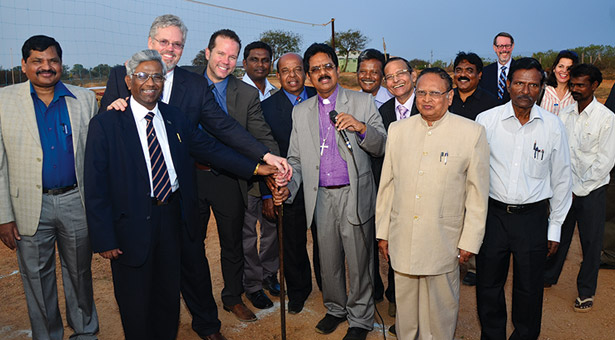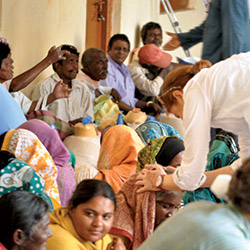The World Acting Globally
Psychology Students and Faculty Support Christian University in India
A Groundbreaking Moment
By Hope McPherson (hmcpherson@spu.edu) | Photo courtesy of Rob McKenna
 Associate Professor of Industrial/Organizational Psychology Rob McKenna (fourth from left) helps break ground for the McKenna College of Education at Immanuel University.
Associate Professor of Industrial/Organizational Psychology Rob McKenna (fourth from left) helps break ground for the McKenna College of Education at Immanuel University.
On January 10, 2014 — with a 17-hour flight and two-hour drive behind them — two doctoral students, three master’s degree students, and Associate Professor of Industrial/Organizational Psychology Rob McKenna arrived in Hyderabad, India.
For the next 10 whirlwind days, the team from Seattle Pacific University’s School of Psychology, Family, and Community met with India’s three Free Methodist bishops; spoke at a pastors’ conference along with a team from Greenville College; taught at Hyderabad’s Immanuel University; had local children in an orphanage teach them how to play cricket; and met, served food to, and prayed with a community of people with leprosy.
They also participated in the groundbreaking of Immanuel University’s new McKenna College of Education, named after SPU’s fifth president, David McKenna, and his wife, Janet — Rob’s parents. Slated to open in July 2014, the school will give India’s poorest an opportunity not only to receive a degree, but also to become educators themselves.
 SPU students spend time in an orphanage in Hyderabad, India.
SPU students spend time in an orphanage in Hyderabad, India.
“We were very blessed to have Dr. Rob McKenna and his students at the Immanuel University India in January,” says Joab Lohara, a Free Methodist bishop and director of mission agency AIM Asia. “The impact they have made is huge.”
In addition to the ground-breaking, McKenna and his graduate students met with Immanuel University’s administrators to discuss the structure of leadership at the school in areas such as selection processes and gender issues. They also created a stakeholder survey for future groups. Explains doctoral student Jacob Redding ’13, “The stakeholders’ survey will be given to all those coming to India to work with Immanuel, and it includes what to expect and what to bring.” It also gives the fledgling university an opportunity to receive feedback from groups after their short-term service has ended.
“We told them we’re not investing in what’s going on here for only the next five to 10 years,” says McKenna. “We’re investing in this for what can happen 100 years from now.”
